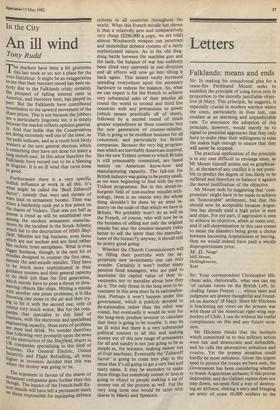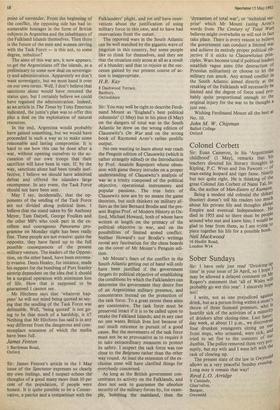Sir: Your correspondent Christopher Hit- chens asks, rhetorically, what one
can say `of certain voices on the British Left, in- cluding James Fenton ... whose taste and judgment are always thoughtful and found- ed on decency' (8 May). Since Mr Hitchens is bracketing my views on the present war with those of the American right-wing sup- porters of Chile, I can do without his rueful compliments on this and any future occa- sion.
Mr Hitchens thinks that the instincts which committed us to this military action were fair and democratic and defensible, and he calls the alternatives nebulous and evasive. Yet the present situation could hardly be more nebulous. Given the urgent need to protect the troops we have sent, the Government has been considering whether to bomb Argentinian airbases; if this proves impossible, and the Galtieri regime does not step down, we must find a way of destroy- ing an airforce, sinking a navy and bringing an army of some 10,000 soldiers to the point of surrender. From the beginning of the conflict, the opposing side has had in- numerable hostages in the form of British subjects in Argentina and the inhabitants of the Falkland Islands themselves. Then there is the future of the men and women serving with the Task Force — is this not, to some degree, nebulous?
The aims of this war are, it now appears, to get the Argentinians off the islands, as a preliminary to some new deal on sovereign- ty and administration. Apparently we don't want sovereignty, but we must hand it over on our own terms. Well, I don't believe that sanctions alone would have restored the status quo, but I certainly believe we could have regained the administration. Indeed, as an article in The Times by Tony Emerson indicated, the junta's plan was to offer this plus a deal on the exploitation of natural resources.
In the end, Argentina would probably have gained something, but we would have proceeded in such a way as to make some reasonable and lasting compromise. It is hard to see how this can be done after a war, without opening ourselves to the ac- cusation of our own troops that their sacrifices will have been in vain. If, by the way, sanctions alone had been totally inef- fective, I believe we should have admitted defeat and offered the islanders large recompense. In any event, the Task Force should not have been sent.
May I say, incidentally, that the op- ponents of the sending of the Task Force are not divided along political lines. I believe that the stand taken by Sir Anthony Meyer, Tam Dalyell, George Foulkes and the other MPs who took part in the ex- cellent and courageous Panorama pro- gramme on Monday night has been really fine. These people are not evasive: quite the opposite, they have faced up to the full possible consequences of the present military venture. The leaders of the Opposi- tion, on the other hand, have been extreme- ly evasive. Denis Healey, for instance, made his support for the bombing of Port Stanley airstrip dependent on the idea that it should be a surgical operation with minimum loss of life. How that is supposed to be guaranteed I cannot see.
Mr Hitchens says that 'whatever hap- pens' he will not mind being quoted as say- ing that the sending of the Task Force was defensible. Well, 'being quoted' is not go- ing to be that much of a hardship, is it? Nothing that Mr Hitchens has said is in any way different from the dangerous and com- monplace nonsense of which the media have been full.
James Fenton
Bartlemas Road, Oxford







































 Previous page
Previous page